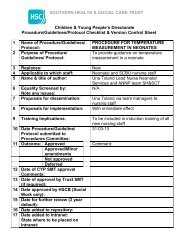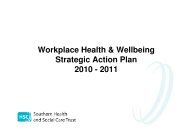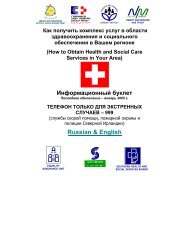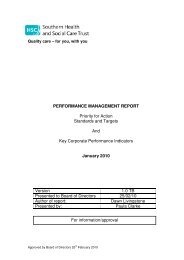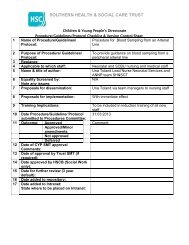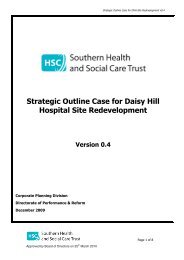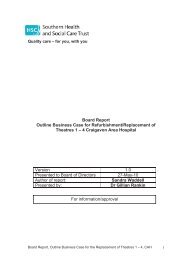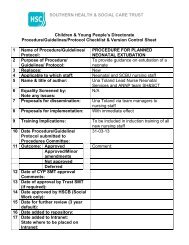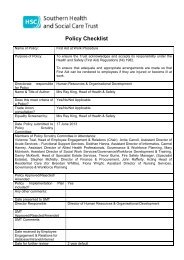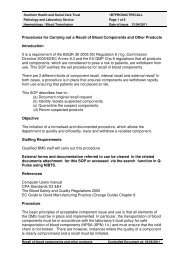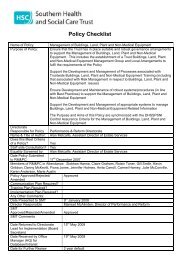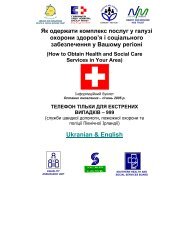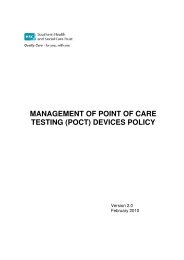Bereaved through suicide - Southern Health and Social Care Trust
Bereaved through suicide - Southern Health and Social Care Trust
Bereaved through suicide - Southern Health and Social Care Trust
- No tags were found...
You also want an ePaper? Increase the reach of your titles
YUMPU automatically turns print PDFs into web optimized ePapers that Google loves.
IntroductionThe Suicide Prevention Co-ordinatorsWorking Group in the Eastern arearevised this edition of the <strong>Bereaved</strong> BySuicide Booklet. The members of thisgroup are, Margaret Woods, Mental<strong>Health</strong> Promotion Manager, PatMcGreevy, Suicide Prevention Coordinator,Fiona Molloy, <strong>Health</strong>Development Specialist for Mental<strong>Health</strong> Promotion/Suicide Prevention,Maria Morgan, Mental <strong>Health</strong>Improvement Practitioner Advanced.We wish to acknowledge thecontributions <strong>and</strong> guidance received inthe development of this booklet fromboth our colleagues <strong>and</strong> various<strong>Bereaved</strong> by Suicide Groups acrossNorthern Irel<strong>and</strong>.We are extremely grateful to Westcarewho developed the initial booklet for theirpermission to revise <strong>and</strong> produce thisedition.2
contentsFeelings you may be experiencingImmediate reactionsNatural responsesWhy?The familyThe childrenIsolationSupportSuggestions for the bereavedInvestigation of a death by <strong>suicide</strong>Sorting out your affairsHelp with the costs of a funeralOther benefits that may be availableHelpful OrganisationsHelpful Reading445677910101316172023313
Feelings you may be experiencingWhen someone dies by <strong>suicide</strong> many people are affected. Parents,partners, relatives <strong>and</strong> friends all feel the pain. People bereaved by<strong>suicide</strong> need to know that there is a range of services available tosupport them <strong>through</strong> the extreme circumstances <strong>and</strong> reactionsthey may experience.Immediate reactionsWhen bereaved by <strong>suicide</strong> the whole fabric of yournormal world disintegrates. You may feel totallyoverwhelmed by what has justhappened <strong>and</strong> may wonder howyou will ever survive this tragicloss. Nothing can prepare aperson for such an event. Youmay find yourself in a place thatis unfamiliar <strong>and</strong> unknown, withno signposts to show the way,feeling disorientated <strong>and</strong>powerless. While shocked <strong>and</strong>numb you may have to cope withevents that are out of yourcontrol. Your heart may feelbroken with pain beyond yourcomprehension.Police, doctors <strong>and</strong> otherprofessionals seem to take over;information <strong>and</strong> answers can bein short supply. There may be anintrusion by the media <strong>and</strong> your4
private grief can become public property. You have a rightto choose not to speak to the media, or you may wish toidentify someone to speak on your behalf. Theseoverwhelming events can leave you feeling stunned. Youmay not want to believe that your loved one has takentheir life <strong>and</strong> search for other explanations. You may feelthat this is happening to someone else <strong>and</strong> hope thatwhen you awake from this awful dream, everything will beback to the way it was before.Natural responsesGrieving is a natural response to loss. It includes crying,remembering, yearning <strong>and</strong> talking - all the many waysthat we express our sadness. Anger can also be a majorpart of grief. We can often struggle with theloss <strong>and</strong> with a sense that the death is unfair.It should not have happened. There can be aterrible sense of loneliness <strong>and</strong> absence. Lifecan lose its meaning for a time, your moodcan be very low <strong>and</strong> it can feel difficult for youto just keep on going, day by day <strong>and</strong> evenhour by hour. Guilt feelings, which are a normal part ofgrief, are often exacerbated. Grieving can cause feelingsof anxiety, depression <strong>and</strong> fatigue. Sometimes thesefeelings become severe <strong>and</strong> prolonged. If you experiencethese symptoms to an extreme degree, you may need totalk to your family doctor.‘Grieving isa naturalresponseto loss..’When your loved one dies by <strong>suicide</strong> the grievingresponse can be more complex <strong>and</strong> even more difficult toresolve. The death is sudden <strong>and</strong> unexpected. It appears5
to have been avoidable <strong>and</strong> so very intense feelings ofanger <strong>and</strong> guilt can arise. It feels like somebody must beto blame.You may feel angry with the person who has died - “whydid he or she leave me?” A deep sense of rejection maybe experienced, particularly if it is a partner who has diedin this way. Family members often feel responsible for thedeceased’s actions <strong>and</strong> believe that they could or shouldhave done something to prevent the death. It is importantto hold on to the reality that the death was not your fault.This is a tragic event that has happened. No one cantake total responsibility for the life of someone else.Anger can be turned out towards others - “someoneshould have noticed”. Others turn the anger onthemselves - “I should have noticed”, <strong>and</strong> so begins aharmful pattern of self blame <strong>and</strong> guilt.Why?The question “why” assumes enormousproportions. You may go over this again <strong>and</strong>again. There can be a frantic search for a notethat will give an explanation but even if one isfound, it will rarely answer your questions. It willtell you how the person who has died felt at amoment of intense distress, but it will probablynot tell you the full story. “Why me? Why us?What have we done to deserve this?”6
You may experience symptoms, for example panicattacks, nightmares; sleep disorders <strong>and</strong> flashbacks,particularly if you have found the body yourself. It is avery natural response to think that you are “going mad”.If a <strong>suicide</strong> note is found the coroner needs the police totake it as part of the investigation. If the <strong>suicide</strong> note isaddressed to a specific individual, that individual cancollect the note from the Coroner's Office when theinvestigation is completed. This must be done in personto ensure that it does not get lost in the post.The familyFamily relationships can suffer at this time. Familymembers, grieving in different ways, can find it hard tounderst<strong>and</strong> one another or to communicate with oneanother. Some relatives may not even want to mentionthe dead person’s name. Conflicts may develop causingfurther heartbreak <strong>and</strong> pain. Sometimes the search forsomeone to blame results in one particular familymember becoming a scapegoat, leaving that personespecially isolated.The childrenChildren in the family may have particular difficulties.Often the family tries to protect the children by keepingthem away from the funeral or not telling them what hashappened. The children, however, can observe thesevere distress all around <strong>and</strong> usually hear all the painfuldetails from other sources eg. at school. It may be usefulto discuss your concerns with the school or other7
organisations which the children areinvolved with eg. youth clubs etc.They can feel trapped in silence as theyare “not supposed to know” <strong>and</strong> they feelthat they do not have permission to talkabout what has happened, to share in thegrieving events <strong>and</strong> to grieve too. Gossipmay harm children if they have not beentold the truth.Children need to be prepared for the outside world after atraumatic death. Honest <strong>and</strong> open communication,shared in loving ways helps most. Younger children areoften satisfied to know that their relation had an accident.Older children will need to know what has happened <strong>and</strong>to be allowed to talk about it <strong>and</strong> to ask questions.Barnardo’s Child Bereavement Service can providesupport for you to do this. They can provide someonewho will listen to you <strong>and</strong> help you identify the best wayto support your child. They can give clear, ageappropriate information both verbally <strong>and</strong> in written form.Barnardo’s will also provide the opportunity for you <strong>and</strong>your children to meet with experienced workers. Theseworkers are very skilled at listening <strong>and</strong> supportingchildren. Opportunities regarding individual work forchildren <strong>and</strong> young people looking at the impact that a<strong>suicide</strong> has had on them <strong>and</strong> their life can be discussed.Regular <strong>and</strong> appropriate feedback will be given to you asthe parent or carer. Families will also have the8
opportunity if appropriate to attend a residential group forthose bereaved by <strong>suicide</strong>.The Barnardo’s booklet ‘How to help children <strong>and</strong> youngpeople bereaved by <strong>suicide</strong>’ will help you to explain the<strong>suicide</strong> to your child or children.IsolationFamilies bereaved by <strong>suicide</strong> often feel socially isolated.Friends <strong>and</strong> neighbours, not knowing what to say, may withdrawfrom you or avoid you. Others may approach <strong>and</strong> ask how youare but you sense that they really do not want to know. You canfeel surrounded by happy families who do not want to see yourpain. As a result you may feel stigmatised <strong>and</strong> isolated. Youmay even feel a sense of shame.You may not know anyone else bereaved in this tragic way. Thismay make your grief journey feel especially lonely <strong>and</strong> difficult.Other outsiders may ask personal questions that are difficult toanswer - it seems they just want a piece of your story. A simplestatement like “He or she was unable to go on” may be enough.In grief a person needs to be able to express <strong>and</strong> work <strong>through</strong>their feelings. There is a need totalk about what has happened <strong>and</strong>about the meaning of the event <strong>and</strong>to ask “why”. It is important to tellyour story <strong>and</strong> to continue telling itfor as long as is necessary for you.This process may go on for a longtime, possibly years.9
SupportTo get <strong>through</strong> this difficult time you will need the supportof other people.You may turn to family, friends, clergy or funeral directors.Since this bereavement is different from otherbereavements, support from counsellors or doctors mayalso be needed. The opportunity to meet others bereavedin the same way may also help. It is important tounderst<strong>and</strong> that an extreme grief reaction is a verynatural response to such a sad <strong>and</strong> tragic event. This is atime to be aware of your own vulnerability <strong>and</strong> to takecare of yourself. Most of all it is important to rememberthat you are not to blame. No one is to blame. You willfind a list of support groups <strong>and</strong> other support services atthe back of this booklet.Suggestions for the bereaved“ ”“Know that you“may feeloverwhelmed bythe intensity ofyour feelings butall your feelingsare normal.” “Know you can survive. You maynot think so but you can.Struggle with “why” it happened until youno longer need to know “why” or until youare satisfied with partial answers.Anger, guilt, confusion <strong>and</strong>forgetfulness are commonresponses. You are not crazy:you are in mourning.10””
“Be aware you may feel inappropriateanger at the person, at the world, atGod, at yourself, its okay to express it.”“Having suicidalthoughts iscommon. It doesnot mean that youwill act on these.You may feel guilty for what you thinkyou did or did not do. Guilt can turn“ into regret <strong>through</strong> forgiveness.””Remember to take onemoment or one day at a time.“ ”“Find a good listener with whom toshare. Call someone if you need to talk.”“Give yourself time to heal.”Remember the choice wasnot yours. No one is the sole“ influence in another’s life.”“Try to put off major decisions.”“Give yourselfpermission to getprofessional help.“Don’t be afraid to cry.Tears are healing.”“” Be aware of the pain offamily <strong>and</strong> friends.“ ”11Expect setbacks.Emotions canreturn like a tidalwave but you mayonly beexperiencing anarea of grief not yetdealt with.”
““Be patient with yourself<strong>and</strong> with others who maynot underst<strong>and</strong>.“”“Steer clear of people who wantto tell you what or how to feel.Many people feel that their ownpersonal spiritual faith can bea great source of strength.“”Realise that the willingness to laughwith others <strong>and</strong> at yourself is healing.Set your own limits <strong>and</strong>learn to say no.“ ”””“It is common toexperiencephysical reactionsto your grief eg.headaches, loss ofappetite, inabilityto sleep.””Ask questions <strong>and</strong> work <strong>through</strong> any anger, guilt, orother feelings you may have until you can let themgo. Letting go doesn’t mean forgetting.“Know that you will never be thesame again, but you can survive<strong>and</strong> even go beyond just surviving.”“Be kind <strong>and</strong> gentle with yourself.”From “Suicide <strong>and</strong> its Aftermath” Ed. E.J. Dunne, J.L. Mackintosh, K. Dunne, W.W. Norton & Co.New York/London12
Investigation of a death by <strong>suicide</strong>Official agencies always intervene in the investigation ofall sudden deaths including death by <strong>suicide</strong>. Theseofficial agencies include the police, coroner <strong>and</strong>pathologist.The bereaved sometimes feel that they have little controlover preliminary events but it is important for such deathsto be investigated thoroughly <strong>and</strong> promptly to facilitateearly release of the body to the family for burial orcremation.When the person is found, the police will preserve thescene until they have completed their preliminaryinvestigation <strong>and</strong> a doctor has confirmed the death. Thedoctor will be the GP, a police doctor or a hospital doctor.An ambulance team will usually be inattendance. The coroner shall be advised <strong>and</strong>they will authorise the transfer of the body bythe family funeral director to a hospitalmortuary for formal identification by a familymember or friend.The coroner is an experienced lawyerresponsible for a local district. The coronerinstructs the police to arrange for the person to undergo apost mortem, which is an external <strong>and</strong> internalexamination of the deceased person. A specially traineddoctor called a pathologist carries this out <strong>and</strong> this maytake place at a different specially equipped mortuary.13
The coroner will issue an interim death certificate to allowthe funeral to take place <strong>and</strong> this can be used for benefitclaims, insurance claims etc. (it will be accepted by mostbut not all organisations) until the coroner issues the finaldeath certificate at the conclusion of their investigations.From Start to FinishDiscovery of bodyPolice/ambulance/doctor contactedFamily informed <strong>and</strong> coroner contactedFuneral DirectorMinister of Religion contactedBody removed to the mortuaryFormal identification of the bodyPost-mortem carried outBody returned for funeral arrangementsCoroner’s InvestigationIssue of Death Certificate15
Sorting out your affairsExtended family <strong>and</strong> friends will need to be informed. Ifthe person who has died has left a will, the executor oradministrator of the estate will need to be informed. Youmay need to contact the solicitor of the person who hasdied to find out who this is. If the executor/administrator isnot told at this stage, there may be difficulties later, forexample, in making funeral arrangements.There will usually be a number of financial issues whichneed sorting out when a person has died. It will be usefulto try <strong>and</strong> collect together as many of the relevantdocuments as can be found. These will include:• The Will• Bank <strong>and</strong> building societybooks <strong>and</strong> statements• Insurance policies• Pension or benefit order books• Details of any creditagreements or outst<strong>and</strong>ingloans• Mortgage Statements• Rent books• Shares, savings certificates,premiums <strong>and</strong> bonds.• Tax Documents.The property <strong>and</strong> belongings of the person who has diedcannot be given away until there is legal authority to do16
so. This legal authority is known as getting a grant of probate ifthere is a will, or letters of administration if there is not. Thesolicitor of the person who has died will be able to guide you onthese matters.Help with the costs of a funeralYou may be able to get help with the cost of the funeral ifyou have made the arrangements for the funeral, you areeligible to claim <strong>and</strong> if you or your partner are getting oneof the following benefits or entitlements:• Income support• Jobseeker’s Allowance (income based)• Housing benefit• Child Tax Credit – awarded at a rate higher than thefamily element• Working Tax Credit – where the disability, or severedisability, element is included in the award, or• Pension credit<strong>and</strong> you have good cause for taking responsibility for thefuneral.Who is eligible to claim?• The partner of the person who has died at the time ofdeath (partner means a person you are married to, or aperson you live with as if you were married; or a civilpartner)17
• The person who has died is a child <strong>and</strong> you haveresponsibility for them• You were a close relative or friend of the person whohas died <strong>and</strong> it is reasonable for you to acceptresponsibility for the funeral costs, <strong>and</strong> they did nothave a partner or parent or son or daughter (for moredetails on this see the social security website:www.dsdni.gov.uk).You may also be able to get help with payments if:• You are paying for a funeral whichtakes place in the United Kingdom<strong>and</strong> the person was originallyresident in the United Kingdom atthe date of their death• You accept responsibility for thefuneral expenses, <strong>and</strong> the <strong>Social</strong>Security Agency accept that it isreasonable for you to claim reimbursement.If you are not receiving one of the benefits or creditswhen the funeral takes place, but claim <strong>and</strong> are entitledto one of them, within three months of the funeral, youmay be entitled to a funeral payment. You should makethe claim for the funeral payment at the same time as youmake the benefit claim or application for the tax credit.You should not wait until you actually receive the benefitfor tax credit as the three-month time limit for making theclaim for funeral payment may expire.18
The <strong>Social</strong> Security Agency must accept that it isreasonable for the bereaved person to be responsible forthe funeral expenses, <strong>and</strong> that there is no-one else whocould be expected to be responsible.The bereaved person should send in a claim for a funeralpayment even if they do not have a bill at that stage. Ifyou delay claiming until the bill is received you may beout side the time limits. The claim form should be sent inwithout the bill as it can be forwarded to <strong>Social</strong> SecurityAgency when the bill is received.You should use Form SF 200 (available from local <strong>Social</strong>Security Offices), or make an initial claim by letter <strong>and</strong> besent Form SF 200. The date of claim will be the datewhen the social security office received the first letter,provided that the form is returned within a month of thatdate.You must also send in the original funeral director’s bill(not a photocopy) with the claim form. If the bereaveddoes not have the bill you should send the claim form<strong>and</strong> the bill as soon as you receive it.The following can be deducted by the <strong>Social</strong> SecurityAgency from a funeral payment:Any of the person’s assets that are available to the familybefore probate or letters of administration are granted.Once probate or letters of administration have been19
granted the <strong>Social</strong> Security Agency can recover thefuneral payment from the persons estate. Funeralexpenses have a priority claim on the estate. However,personal possessions left to relatives <strong>and</strong> the value of ahome occupied by a surviving partner do not count aspart of the estate.Please note that you may be entitled to a furtherbereavement payment if your late spouse or civil partnermet the National Insurance contributions <strong>and</strong> either:• You’re under state pension age (60 female; 65 male);or• Your late spouse or civil partner was not entitled to aCategory A State Retirement Pension when they diedOther benefits that may be availableWidowed Parents AllowanceA man or a woman (who is under state pension age) canget widowed parents allowance if their late spouse or civilpartner met the National Insurance contributionconditions <strong>and</strong>:• He or she has a child for whom they are entitled to, orcan be treated as entitled to child benefit; or• Where a widow or a surviving civil partner is expectinga child:- by her late husb<strong>and</strong>- by her late civil partnerWidowed Parents Allowance is payable regardless ofcapital <strong>and</strong> whether the claimant does any work.20
<strong>Care</strong>rs AllowanceEntitlement to <strong>Care</strong>rs Allowance can continue up to 8weeks after the death of a disabled person being caredfor, provided that all other conditions are satisfied.All this information in relation to benefits has been takenfrom the <strong>Social</strong> Security Agency web site that can beaccessed at www.dsdni.gov.ukLife InsuranceMost life insurance policies have a 2-year <strong>suicide</strong>exemption. If a <strong>suicide</strong> occurs within 2 years of taking outthe policy the company will not pay out. After the 2-yeartime period, they must pay out just like any other death.It is advised however that you contact your insurancecompany for further advice.Since April 2001 Widows Benefits have been replaced bya Bereavement Payment; a Widowed Parent’s Allowance;Bereavement Allowance <strong>and</strong> a Bereavement Premiumwhich is included as part of Income Support, IncomeBased Jobseekers Allowance <strong>and</strong> Housing Benefit.Further advice <strong>and</strong> assistance can be obtained from the<strong>Social</strong> Security Agency, Inl<strong>and</strong> Revenue, localindependent advice centre or Citizens Advice Bureau.Dealing with an Estate: getting probateEverything owned by a person who has died is known asher/his estate.21
The estate of the person who has died is usually passedto surviving relatives <strong>and</strong> friends, either according toinstructions in a will, or according to the rules of intestacywhere someone has died without a will.The legal authority required to act on behalf of a personwho has died is known as a grant of representation.There are two types of grant of representation:• Probate - Probate given to a person named in a will asan executor.• Letters of Administration - Letters of administration aregiven if there is no will, if a will is not valid, if there areno executors named in the will or if the executorscannot or are unwilling to act. Letters of administrationshould normally be applied for by the next of kin.In this section the word probate will be used to describeboth types of grant of representation.A grant of probate is a High Court document issued bythe probate registry. It proves that a person has the legalauthority to deal with the estate <strong>and</strong> affairs of the personwho has died. It is especially important when dealing withinstitutions holding money in the name of the person whohas died. In effect the grant of probate transfers all of theproperty of the person who has died to the personholding the grant of probate.22
Helpful OrganisationsCRUSEBereavement support <strong>and</strong> counselling for anyoneexperiencing problems with the death of a loved one<strong>through</strong> <strong>suicide</strong>. Group support, information <strong>and</strong> literatureon bereavement <strong>and</strong> loss.Day by Day Helpline Tel: 0844 477 9400Open Monday to Friday 9.30am - 5pmEmail: helpline@cruse.org.ukYoung Person's freephone helpline Tel: 0808 808 1677Email: info@rd4u.org.ukwww.crusebereavementcare.org.ukNewry OfficeMoy Office9 Enterprise House Merrion HouseWin Business Park46 The SquareCanal QuayMoy BT71 7SGNewry BT35 6PH Tel: 028 8778 4004Tel: 028 3025 2322LIFELINE COUNSELLINGNo matter what your age or where you live in NorthernIrel<strong>and</strong>, Lifeline offer immediate help over the phone 24/7 ifyou, or someone you know is in distress or despair. All callsare answered by qualified counsellors who are available tolisten, help <strong>and</strong> support your needs in confidence. They areexperienced in dealing with issues such as <strong>suicide</strong> selfharm, abuse, trauma, depression, anxiety. If appropriate,you could be offered an appointment for face to face23
counselling or other therapies in your local area within 7days. Lifeline can also put you in touch with follow-upservices to ensure you receive the best possibleresponses to your needsLifeline also gives support <strong>and</strong> guidance to families <strong>and</strong>carers, concerned friends, professionals, teachers, youthworkers, clergy <strong>and</strong> communities.Just call Lifeline Helpline 0808 808 8000www.lifelinehelpline.infoFor hard of hearing Textphone 18001 0808 808 8000Calls are free from l<strong>and</strong>lines <strong>and</strong> mobile phones.SamaritansSamaritans provides confidential, non-judgementalemotional support, 24 hours per day for peopleexperiencing feelings of distress, despair, including thosewhich could lead to <strong>suicide</strong>.Craigavon - 162 Thomas St | Portadown | BT62 3BDTel: 028 3833 3555Newry - 19 St Coleman’s Park | NewryTel: 028 3026 6366 Branch open 9:30am - 9pmExcept Wednesday 7:30pm - 9pmHard of hearing, deaf & speech impaired only Tel: 0845 7909192www.samaritans.orgTel: 08457 90 90 90Email: jo@samaritans.org24
specialises in working with children <strong>and</strong> young people. TheFamily Trauma Centre is very willing to discuss suchconcerns with parents <strong>and</strong> will arrange to meet with them<strong>and</strong> their child or young person when this is required.Tel: 028 90 204700Citizens Advice BureauImpartial, confidential free advice on welfare, benefits <strong>and</strong>money advice.Armagh Office | 9 McCrums Court | Armagh | BT61 7RSTel: 028 3752 4041Banbridge Office | 77 Bridge Street | Banbridge | BT32 3JLTel: 028 4062 2201Craigavon District | Portadown <strong>Health</strong> Centre | TavanaghAvenue | Portadown | BT62 3BETel: 028 3836 1181Dungannon Office | 5-6 Feeney Lane | Dungannon |BT70 1TX Tel: 028 8772 5299Lurgan Office | The Town Hall | 6 Union Street | Lurgan |BT66 8DY Tel: 028 3836 1181Newry & Mourne Office | Ballybot House | 28 Cornmarket |Newry | BT35 8BG Tel: 028 9042 8288www.citizensadvice.co.ukAware Defeat DepressionServices, support groups <strong>and</strong> self-help for depression /bi-polar disorder.26
Helpline: 0845 120 2961Email: help@aware-ni.orgBelfast Office | Philip House | 123-127 York Street |Belfast Tel: 028 9032 1734Parenting NIServices offered include support, guidance <strong>and</strong>counselling for parents.www.parentingni.orgHelpline: 0808 801 0722Belfast Office | Franklin House | 12 Brunswick StreetBelfast Tel: 028 9023 8800Compassionate FriendsA charitable organisation of bereaved parents, siblings<strong>and</strong> gr<strong>and</strong>parents dedicated to the support <strong>and</strong> care ofother bereaved parents, siblings <strong>and</strong> gr<strong>and</strong>parents whohave suffered the death of a child/children.Helpline: 0845 123 2304www.tcf.org.ukEmail: info@tcf.org.ukRelateServices include relationship for couples or individuals,psychosexual therapy.Relate Teen - counselling for young people onrelationship issues.Belfast Office | 3 Glengall Street | BelfastTel: 028 9032 345427
Coroner’s ServiceCoroners are independent judicial officers who areavailable to deal with matters relating to deaths that mayrequire further investigation to establish the cause ofdeath. The Coroner will seek to establish the cause ofdeath <strong>and</strong> will make whatever inquiries are necessary todo this eg. ordering a postmortem examination, obtainingwitness statements <strong>and</strong> medical records, or holding aninquest.Mays Chambers | 72 May Street | Belfast | BT1 3JLTel: 028 9044 6800coronersoffice@courtsni.gov.ukwww.coronersni.gov.uk<strong>Southern</strong> Area Support Groups for those<strong>Bereaved</strong> by SuicideThe bereavement support groups offer support,information <strong>and</strong> literature on bereavement <strong>and</strong> loss foranyone who has experienced a loss of a loved one<strong>through</strong> <strong>suicide</strong>.Niamh Louise Foundation32 Coalisl<strong>and</strong> Road | Killybrackey | Dungannon |Co TyroneTel: 028 8775 3327Email: info@niamhlouisefoundation.com<strong>Bereaved</strong> Through Suicide Support Group meets 1stThursday every month @ 7pm‘Drop In’ Coffee Morning meets every Wednesday10:30am - 12:20pm28
PIPS Newry <strong>and</strong> Mourne30 Kilmorey Street | NewryTel: 028 3026 6195Email: info@pipsnewry<strong>and</strong>mourne.org<strong>Bereaved</strong> Through Suicide Support Group meets lastWednesday of every month @ 8pmCoffee Morning every Wednesday 11am - 12:30pmSpringwell Centre- Rainbows Children Bereavement Programme55 Edward Street | Lurgan BT66 6DBFor further information contact Tel: 028 3834 7222PIPS Upper BannMeets at Flat 17 | Mount Zion House | Edward Street |Lurgan BT66 6DBFor further information contact 07901597608The following organisations can providefurther information <strong>and</strong> support:Protect Life CoordinatorPromoting Wellbeing Team | St Luke’s Hospital | Armagh |BT61 7NQTel: 028 3741 2882Email: nuala.quinn@southerntrust.hscni.net29
Niamh Louise Foundation32 Coalisl<strong>and</strong> Road | Killybrackey | Dungannon |Co TyroneTel: 028 8775 3327Email: info@niamhlouisefoundation.comPIPS Newry <strong>and</strong> Mourne30 Kilmorey Street | NewryTel: 028 3026 6195Email: info@pipsnewry<strong>and</strong>mourne.orgREACT Ltd.30A Ardery’s Lane | BanbridgeTel: 028 4062 8829Email: counreact@aol.comPIPS Upper BannMeets at Flat 17 | Mount Zion House | Edward Street |Lurgan BT66 6DBTel: 07595 221334Email: pipsupperbann@hotmail.co.ukAction Mental <strong>Health</strong> MensSana13 Church Street | Portadown BT66 6DBTel: 028 3839 2314Email: cloughran@amh.org30
Helpful ReadingBooks for AdultsA Grief Observed, Lewis, CS, FaberAftershock, David Cox <strong>and</strong> C<strong>and</strong>y Neely Arrington, B&HPublishing Group, ISBN No 0805426221A Special Scar – the experience of people bereavedby <strong>suicide</strong>, A. Wertheimer, Routledge (1991)A Voice For Those <strong>Bereaved</strong> By Suicide, SarahMcCarthy, Veritas (2001)<strong>Bereaved</strong> by Suicide, Patrick Shannon (2000), CruseBereavement <strong>Care</strong>Echoes of Suicide, Siobhan Foster Ryan & LukeMonaghan (eds), Veritas Publications (2001)Grieving a Suicide, Albert Y Hsu, InterVarsity Press,ISBN No 0830823182Healing Grief: A Guide To Loss & Recovery, BarbaraWard, Vermillion (1994)Suicide & the Irish, Dr. M. Kelleher, Mercier Press (1998)Why People Die By Suicide, Thomas Joiner (2007)31
Books for Young PeopleHealing your Grieving Heart: for Teens, Alan D. Wolfelt,Companion Press (2001How to help children <strong>and</strong> young people bereaved by<strong>suicide</strong>, Barnardo’s Northern Irel<strong>and</strong> (2008)Facing Grief: Bereavement & the Young Adult, SusanWallbank, Lutterworth Press (1996)When Someone Dies: Help for Young People coping withGrief, Dwaine Steffes, Cruse Bereavement <strong>Care</strong> (1997)Books for Young ChildrenA Child’s Questions about Death, Available free fromDignity, Tel 0800 387717Beyond The Rough Rock – Supporting A Child Who HasBeen <strong>Bereaved</strong> By Suicide, Winstons Wish Publicationswww.winstonswish.org.ukCaring for <strong>Bereaved</strong> Children, Mary Bending (1993),Cruse Bereavement <strong>Care</strong>How to help children <strong>and</strong> young people bereaved by<strong>suicide</strong>, Barnardo’s Northern Irel<strong>and</strong> (2008)32
Books for people with learning disabilitiesAm I allowed to cry? A study of bereavement amongstpeople who have learning disabilities, Maureen Oswin(1991)When somebody dies, Sheila Hollins, S<strong>and</strong>ra Dowling &Noelle Blackman (2003)When mum died, Shelia Hollins & Lester Sireling (2004)When dad died, Shelia Hollins & Lester Sireling (2004)33
June 2012




